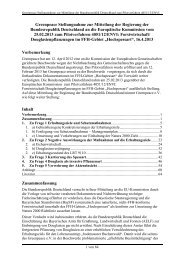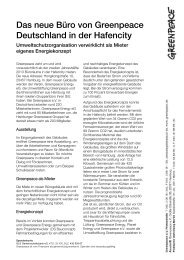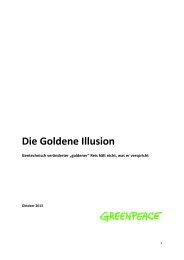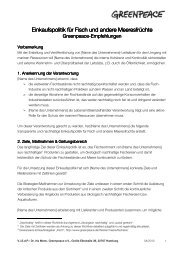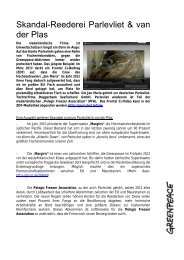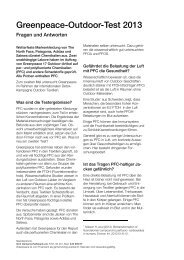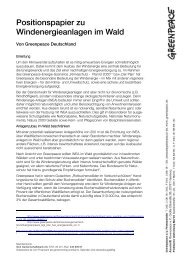SOLAR GENERATION - Greenpeace
SOLAR GENERATION - Greenpeace
SOLAR GENERATION - Greenpeace
You also want an ePaper? Increase the reach of your titles
YUMPU automatically turns print PDFs into web optimized ePapers that Google loves.
FOREWORD<br />
This report demonstrates that there are no technical, economic or resource barriers to supplying<br />
1.1% of the world’s electricity needs from solar power alone by 2020; and this against the<br />
challenging backdrop of a projected near doubling of electricity demand by that date. Solar<br />
energy is a success story. It already supplies electricity to several hundred thousand people,<br />
provides employment for over 10,000 people and generates business worth more than<br />
¤ 3 billion annually<br />
In the future, the pace of change and progress could be even more rapid as the solar industry<br />
unlocks its hidden promise.<br />
By the end of 2003 more than 2,400 Megawatts (MW) of solar photovoltaic power had been<br />
installed world wide, generating enough electricity to power more than 700,000 households<br />
with an average European consumption. As outlined in the opening chapters, the success of the<br />
industry to date has been largely created by the efforts of just three countries - Japan, Germany<br />
and the USA. It is obvious that if other countries matched these efforts, the impact would be far<br />
greater. This underlines the fact that today’s technology is merely the tip of the iceberg, and a<br />
huge potential remains untapped. Solar power is capable of continuing its successful history<br />
over the next two decades if a positive political and regulatory framework is implemented, one<br />
that removes the obstacles and market distortions that currently constrain the industry’s real<br />
potential.<br />
The benefits of solar power are compelling: environmental protection, economic growth, job<br />
creation, secure and distributed generation, diversity of fuel supply and rapid deployment, as<br />
well as the global potential for technology transfer and innovation. The underlying advantage<br />
of solar energy is that the fuel is free, abundant and inexhaustible. The total amount of energy<br />
from the sun that reaches the earth’s surface every year is enough to provide for annual global<br />
energy consumption 10,000 times over. Yet these benefits remain largely untapped; most<br />
energy decisions taken today overlook solar power as a modular technology which can be<br />
rapidly deployed to generate electricity close to the point of consumption. Phasing in solar<br />
photovoltaics therefore requires a shift from centralised to decentralised power production,<br />
allowing far greater control to individual consumers.<br />
There is now a solid international consensus on the threat of dangerous climate change and<br />
that business-as-usual in the energy sector is not an option any more; the world must move<br />
into a clean energy economy. The rapidly increasing demand for fossil fuels has already in 2004<br />
propelled the price of crude oil above US$ 50 per barrel for the first time, and has demonstrated<br />
that production of “cheap” fossil fuels can no longer grow as fast as demand. Economies that<br />
have not prepared themselves for diversification of their energy mix will particularly be<br />
affected by these developments in world oil markets. Solar power is a prime choice in<br />
developing an affordable, feasible, global power source that is able to substitute for fossil fuels<br />
in all climate zones around the world.<br />
The European Photovoltaic Industry Association (EPIA) and <strong>Greenpeace</strong> have produced this new<br />
edition of Solar Generation in order to update our understanding of the contribution that solar<br />
power can make to the world’s energy supply. The report is a practical blueprint to show that<br />
4



